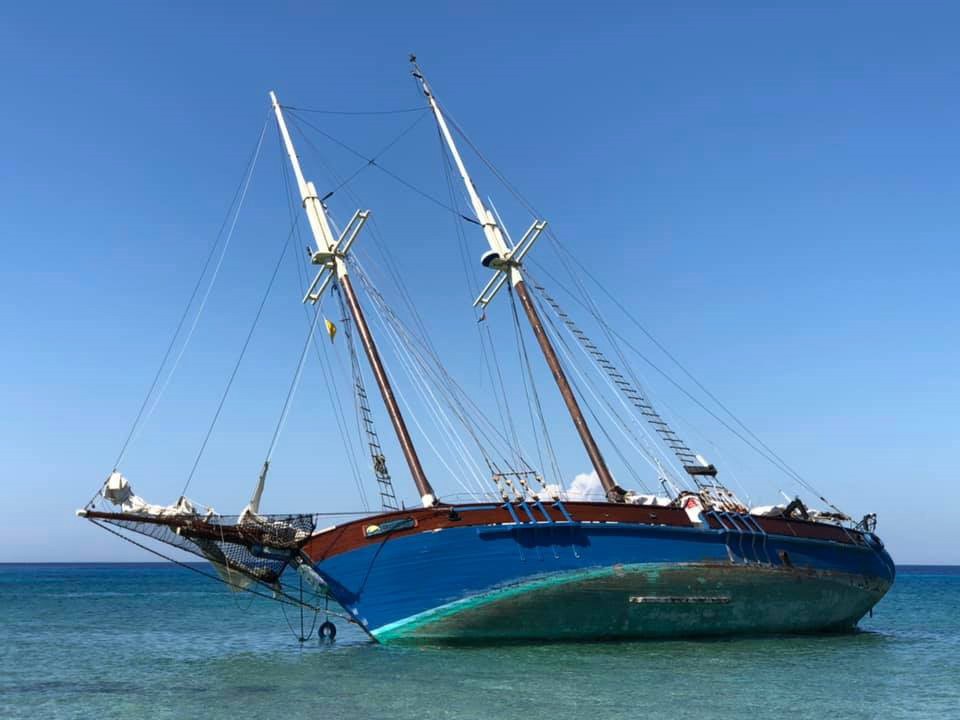The owner of the last surviving St. Lawrence River schooner, beached in Cuba after running aground more than two months ago, says looters made off with thousands of dollars worth of equipment from the ship last week.

The Grosse-Ile, the last seaworthy vessel of its kind and an important piece of Quebec’s maritime heritage, has been grounded since Jan. 27, and salvage efforts have been repeatedly thwarted by Cuban authorities, said the ship’s owner, Didier Epars.
For two weeks, everything has been in place to remove the schooner from the beach, but for reasons that remain unclear, Cuban authorities have delayed issuing a permit for a tug from the Cayman Islands requisitioned by Epars’ insurer.
READ MORE: St. Lawrence Seaway marks 60 years of business
The delay allowed thieves to strip the two-masted schooner last week of GPS antennas, an outboard motor for a dinghy and valuable rigging for the sails.
Since he and his son, fearing for their lives, deliberately ran aground in a storm, the schooner has been looted several times, but Epars said the Cuban army refused to allow him to camp on the beach to watch over the ship.
His son has since left Cuba, but Epars remains “in custody” — albeit at a holiday resort run by the Cuban military. The Maria La Gorda resort is close to his ship, which he monitors from a distance when he can. There is a military base next to the resort, which is in a national park in a remote part of Cuba.
READ MORE: Quebecer confined in Cuba says he’s been convicted in 2nd trial

Get breaking National news
The shipwrecked skipper wonders where the looters have come from, since the national park is uninhabited and the nearest village, El Cayuco, is inland 45 kilometres from Maria La Gorda.
Epars said it is clear that the theft required the use of boats, and the only boats nearby are those of the army, recently relaunched after undergoing repairs for about two weeks.
The looting is all the more discouraging as Epars had hoped the Grosse-Ile would have been refloated weeks ago. On March 23, he was told the salvage would take place the following Tuesday, March 26, but the necessary permit has still not been provided.
WATCH BELOW: St. Lawrence Seaway hits milestone

Epars’ insurance broker, the British firm Concept Special Risks, is also questioning the delay.
In an email to The Canadian Press last week, company representative Mark Thomas said a Cuban salvage company, also run by the military, is responsible for obtaining the permit. Thomas said the process has been bogged down by requests for information from the Cubans.
“A lot of the information doesn’t seem relevant, but they insist,” Thomas said.
Built in 1951, the Grosse-Ile was used to provision the island east of Quebec City after which it was named. Epars bought it in 1992, but it needed to be almost entirely rebuilt. It took him 20 years to get the necessary permits to take on passengers, and in 2015 the schooner returned to the water, sailing between Quebec City and Montreal.
Quebec Minister of International Relations Nadine Girault said in an interview that her office is closely monitoring the situation in collaboration with the Canadian Embassy in Cuba. “We offered our support to the embassy, but our hands are a little tied on it, because it is really under federal jurisdiction,” she said.
The Cuban embassy in Ottawa did not return a call from The Canadian Press.







Comments
Want to discuss? Please read our Commenting Policy first.